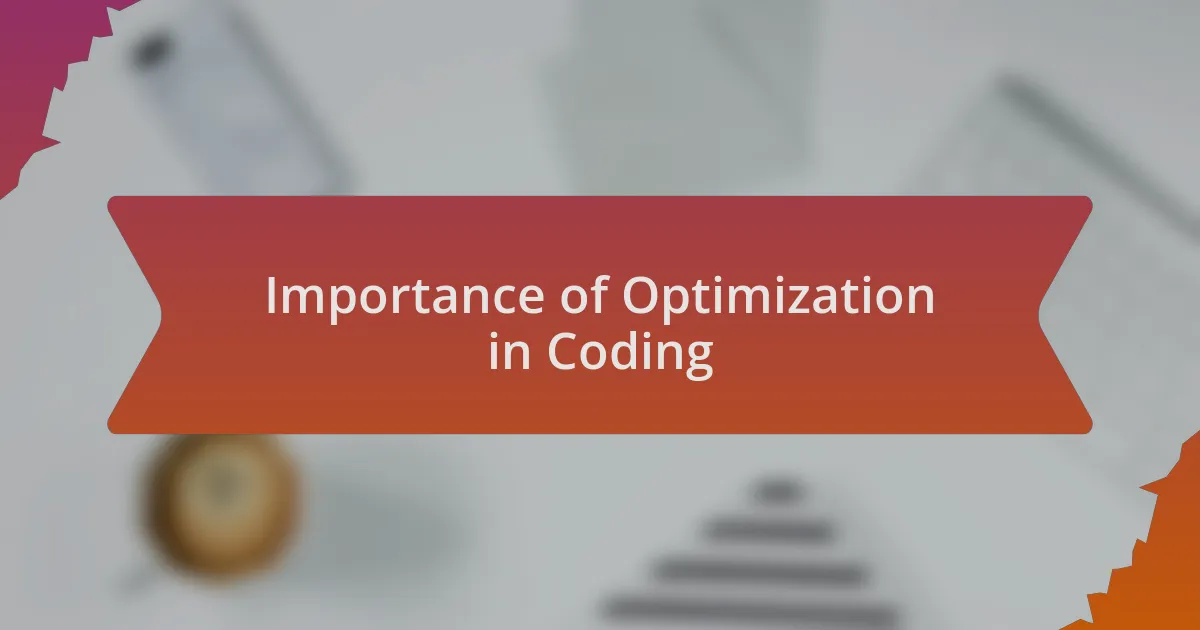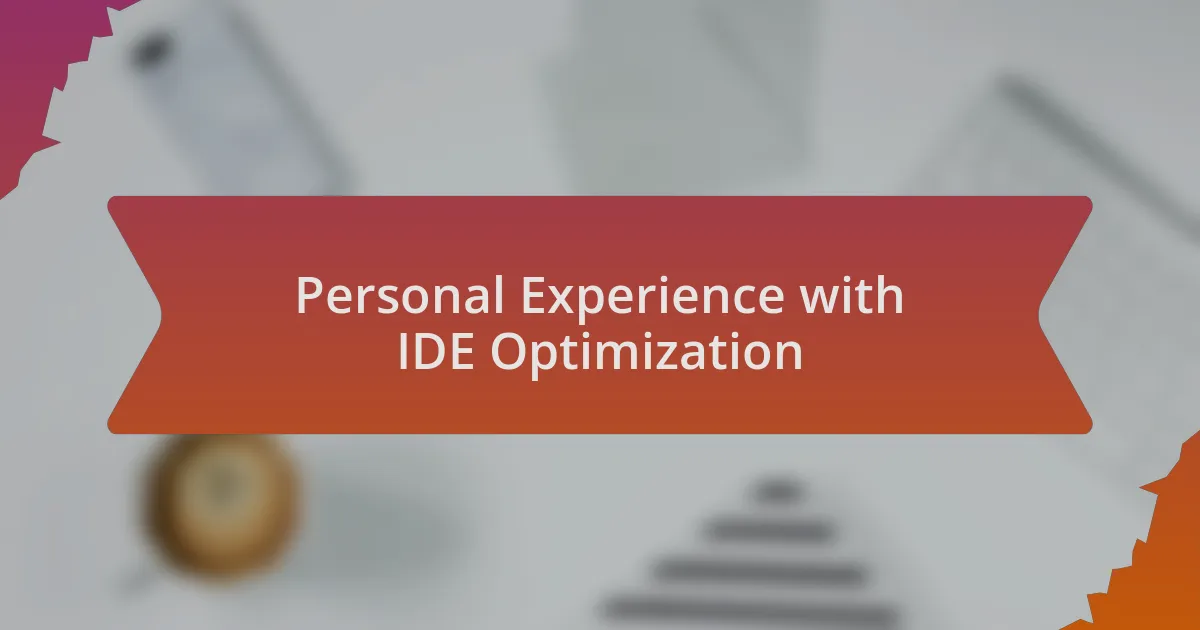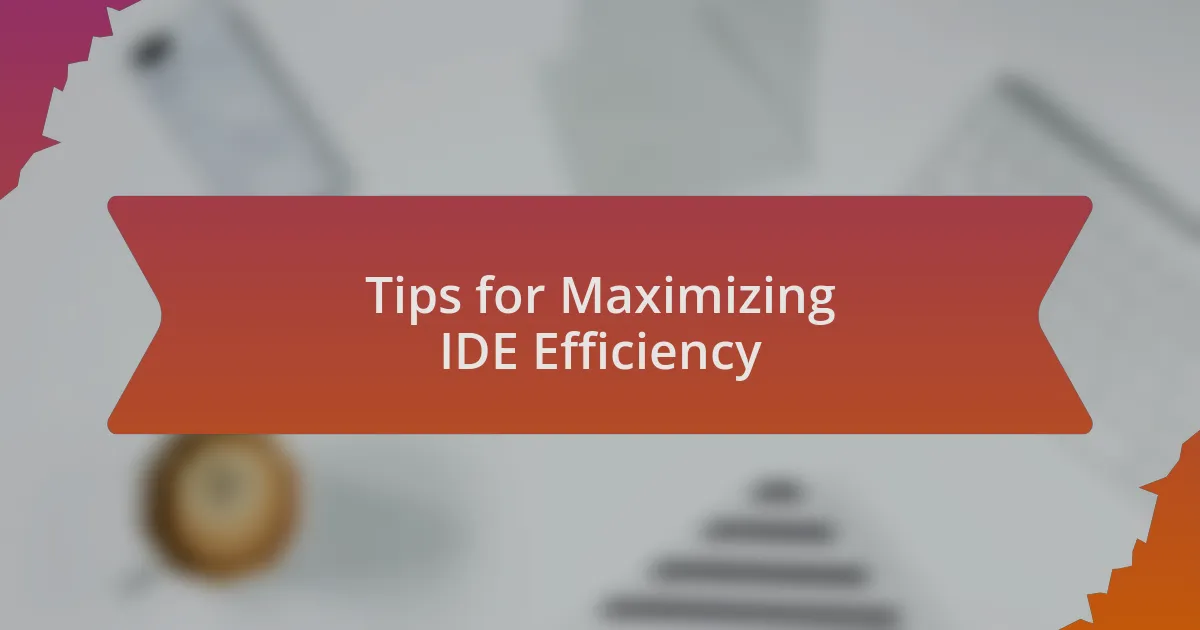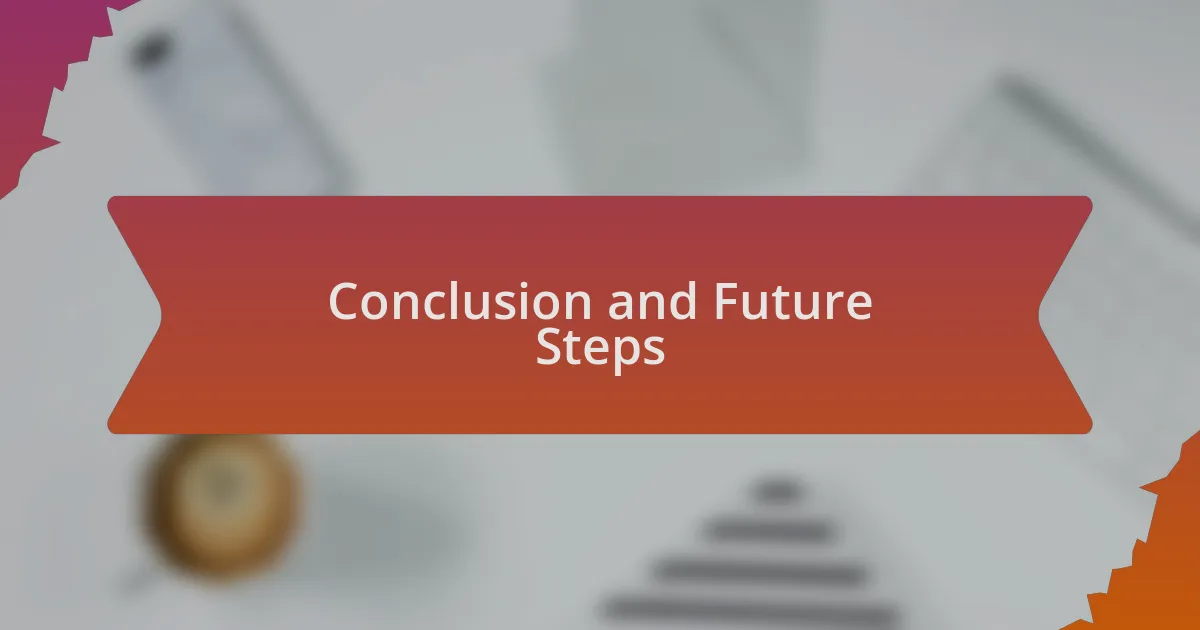Key takeaways:
- IDEs enhance coding through features like syntax highlighting, debugging tools, and version control integration, improving productivity and fostering creativity.
- Optimization is crucial for coding efficiency, leading to better performance, maintainability, and improved user experiences.
- Choosing the right IDE involves considering community support and extensibility, allowing for a personalized coding environment that grows with the developer.
- Maximizing IDE efficiency can be achieved through mastering shortcuts, utilizing plugins, and maintaining an organized workspace.

Understanding IDEs and Their Benefits
An Integrated Development Environment, or IDE, is more than just a simple text editor; it’s a powerful toolkit designed to streamline coding. I remember the first time I tried a popular IDE—everything from syntax highlighting to code completion amazed me. It felt like someone had turned on the lights in a dark room filled with coding challenges.
The benefits of using an IDE often extend far beyond mere convenience. I’ve experienced moments when debugging seemed utterly daunting until I discovered the debugger feature within my IDE; it transformed my approach to finding and fixing errors. Can you imagine tackling a complex project without the ability to step through your code line by line? This feature alone has saved me hours of frustration.
Moreover, IDEs often come equipped with version control integrations, which have become essential in my development process. When I hit a snag, I can easily revert to a previous state, almost like having a safety net during a tightrope walk. Have you ever noticed how a simple click can lead to peace of mind? For me, the ability to experiment without the fear of losing my progress unlocks a new realm of creativity in coding.

Importance of Optimization in Coding
Optimization in coding isn’t just a luxury; it’s a necessity that can dramatically enhance productivity and code quality. I recall a time when I was solely focused on writing more lines of code, thinking it would make my program faster. It didn’t take long to realize that messy, unoptimized code only led to performance issues and headaches down the line. Have you ever felt the frustration of an application dragging its feet? That experience taught me that optimizing my code not only improves performance but also makes my projects far more maintainable.
When I started prioritizing optimization, I noticed a significant shift in my development workflow. For instance, I began to analyze algorithms more critically, choosing those that significantly reduced processing time. This wasn’t just an academic exercise; it translated into tangible benefits, like smoother user experiences and happier clients. The realization that optimization could lead to more elegant, efficient solutions was a game-changer for me—have you found that the little tweaks often lead to the biggest improvements in your work?
Understanding the importance of optimization in coding often brings a sense of responsibility. After all, writing optimized code means considering the end-user experience. I once revamped a project where users were facing lag due to unoptimized queries. The moment I implemented more efficient data handling, the feedback was overwhelmingly positive. It made me reflect: how much responsibility do we, as developers, have towards our users? In my eyes, optimization isn’t just about improving performance; it’s about delivering value.

Key Features of Popular IDEs
When exploring the world of Integrated Development Environments (IDEs), several key features stand out that can significantly enhance our coding experience. One of my favorites is code auto-completion, which acts like a helpful guide as I type. It not only speeds up the coding process but also minimizes errors by suggesting the correct function names or parameters. Have you ever found yourself staring blankly at a coding error and wishing for a little nudge in the right direction? That’s exactly what auto-completion provides.
Another aspect of IDEs that I truly value is integrated debugging tools. I vividly remember a project where I was knee-deep in code, trying to track down a pesky bug. The ability to set breakpoints and step through my code line by line made all the difference. It felt like having a magnifying glass to find those hidden mistakes. Isn’t it frustrating to waste hours trying to figure out what’s wrong? A good debugger can turn that moment of aggravation into one of clarity and understanding.
Lastly, version control integration is an absolute game changer. Being able to manage my code revisions without leaving the IDE is a feature I rely on daily. In one instance, while collaborating with a friend on a web application, we encountered an unexpected conflict during merges. Thanks to the built-in version control tools, we were able to resolve the issue seamlessly. Have you ever struggled to keep track of different code versions? A robust version control feature can save not just your code but also your sanity.

How I Chose My IDE
Choosing the right IDE was a journey for me, shaped by both my coding needs and personal preferences. I started by trying out popular options like Visual Studio Code and JetBrains IDEs, eventually gravitating towards the one that felt intuitive and personalized. Have you ever used an IDE that just clicked? That’s how I knew I’d found my match—something that not only met my functional requirements but also resonated with my workflow.
One critical factor influencing my choice was the community and support surrounding the IDE. I recall a time when I encountered a daunting challenge while experimenting with a new programming language. The online forums and documentation for my chosen IDE were invaluable during that tough moment. It was comforting to know that a wealth of resources, shared knowledge, and even fellow developers were just a click away. Isn’t it reassuring to have a supportive community backing your coding journey?
Lastly, I valued the extensibility of the IDE I selected. I remember being frustrated with initial limitations of an IDE I tried, feeling hindered as I sought to customize my environment. Once I made the switch and discovered the vast library of plugins and extensions available, it was like entering a playground tailored to my preferences. Have you ever felt empowered by the ability to mold your tools? That’s the beauty of a flexible IDE—it grows alongside my skills, enabling me to explore and innovate more freely.

Personal Experience with IDE Optimization
Optimizing my coding experience with an IDE was more than just adjusting settings; it was about finding a rhythm that maximized my productivity. I vividly remember the first time I set up shortcuts for my most used commands. It felt like discovering a secret weapon in my coding arsenal. Have you ever experienced that spark of joy when a small tweak makes a big difference? That moment really solidified my commitment to exploring every optimization available.
I also took the time to customize my themes and layouts, tailoring the visual elements to my preference. One day, after a long session of coding, I found myself feeling overwhelmed by the default settings, which were cluttered and distracting. After switching to a minimalist theme and rearranging panels, I felt a wave of clarity wash over me. Isn’t it fascinating how a simple color change can refresh your focus and motivation?
As I continued to dive into optimization, I discovered the power of integrated debugging tools. I can still recall the thrill of tracking down a pesky bug in record time; the experience was almost exhilarating. Have you ever played detective while coding? With an efficient debugger right at my fingertips, it transformed the sometimes tedious task into an engaging challenge, ultimately making me a more confident coder.

Tips for Maximizing IDE Efficiency
When it comes to maximizing IDE efficiency, one of my most effective strategies has been mastering keyboard shortcuts. I remember the first time I committed to learning them; it was like unlocking a new level in a game. Each additional shortcut I learned felt like a small victory that saved me precious seconds, and over time, those seconds added up to hours of increased productivity. Have you ever noticed how a simple keystroke can propel you forward?
Another technique that greatly enhanced my workflow was utilizing plugins and extensions. I had always marveled at the plethora of tools available, but it wasn’t until I integrated a code linter that everything clicked into place. Suddenly, code errors jumped out at me before they even had a chance to slow me down. It was like having a trusty sidekick who was always ready to catch mistakes. How many hours do you think we waste searching for those sneaky bugs?
Finally, I learned the art of maintaining an organized workspace within the IDE. At first, it felt tedious to go through my files and categorize them, but the clarity I gained was worth the effort. I distinctly remember tackling a project that had multiple components scattered everywhere. Once I organized everything neatly, I discovered a renewed sense of control that enhanced my focus and creativity. Do you often find yourself lost in a sea of files, or does chaos bring out the best in your coding adventures?

Conclusion and Future Steps
With the strategies I’ve shared, it’s clear that optimizing my coding experience with IDEs has been transformative. I often reflect on how these simple adjustments have reshaped my productivity—from learning shortcuts to leveraging plugins. Each decision not only made my coding smoother but has also filled me with a sense of achievement, proving that even small changes can lead to significant results.
Looking ahead, I feel inspired to continue exploring the latest tools and updates in IDEs. Technology evolves quickly, and I want to stay ahead of the curve. Have you considered what the next game-changer might be for your coding practice? I’m eager to experiment more with emerging features and to see how they can further enhance my efficiency and creativity.
As I progress, I plan to share my learnings and insights with the community. I believe that collaboration and discussions among developers can lead to even greater discoveries. What if we could help each other unlock even more potential in our coding journeys? I see it as a collective effort to grow and innovate together, ensuring that we all thrive in this exciting field.